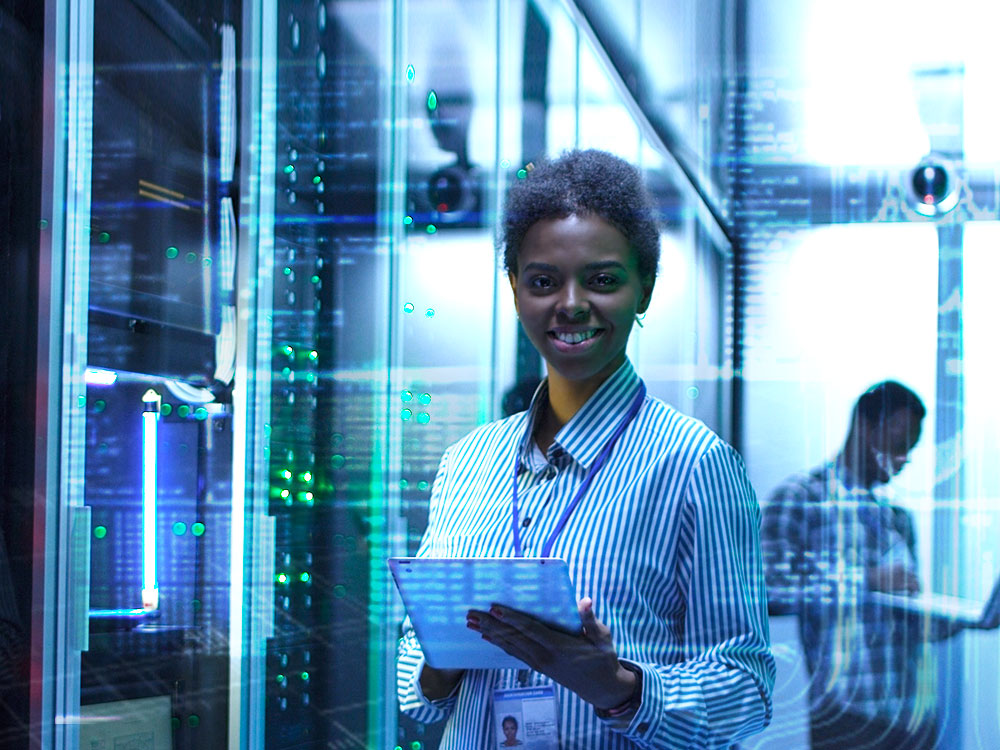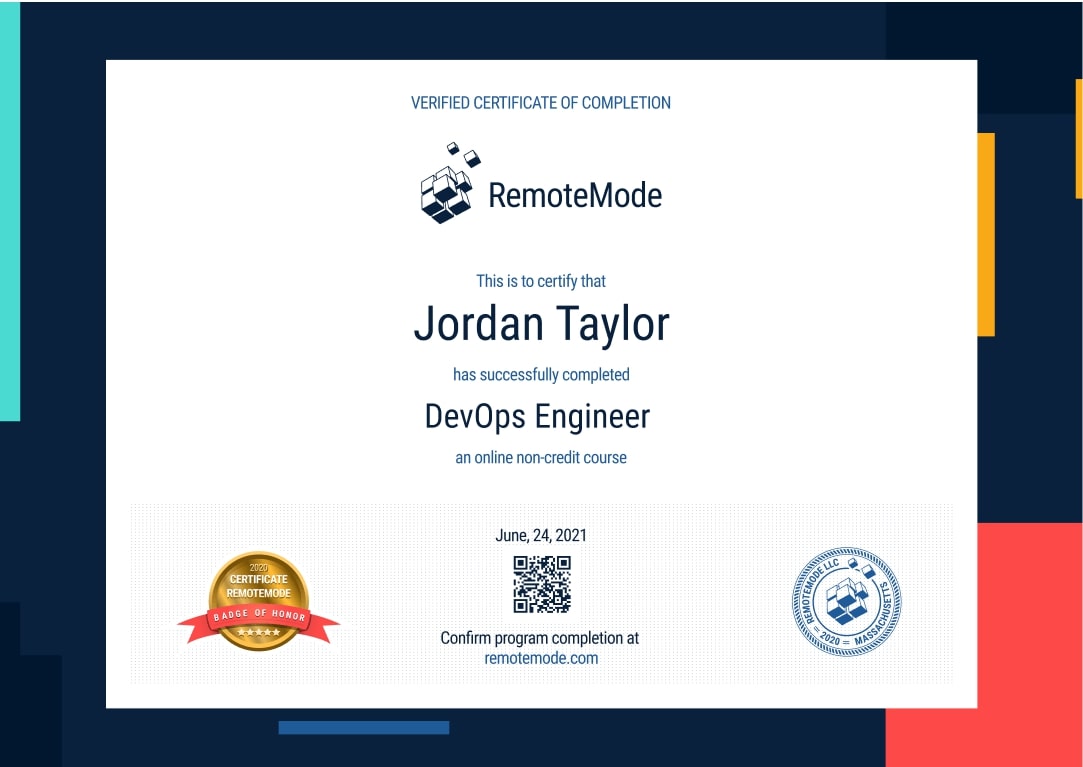Become a DevOps Engineer
Combine traditional IT with its servers, connections, fiber optic, etc., and modern technology like cloud, mobile apps, and iPhones. Launch the software and close the gap between software development and operations. Today DevOps is the newest and up-to-date direction in the IT labor market.
- 4 month
- 123 lessons
- 5 hours per week
- 86 hours



DevOps Engineer Mission Forecast
Landing Zone
With the expansion of the IT sphere, the demand for the DevOps of Engineers is steadily increasing. Lots of new platforms, services and tools are entering the market, and companies are headhunting the specialists who can organize and support these processes. Some biggest and world-known companies like IBM, Microsoft, and Cisco open more than 43,000 positions for DevOps Engineers. The demand is going to show a 24% increase by 2026.
Mission Objective (Who’s Hiring Right Now)
DevOps Engineer Overview
The implementation of the DevOps model for management and software development is expanding and shows stable growth during the last 5 years. Industry leaders all over the world, from NASA to Target, and Hertz to Netflix hire DevOps Engineers to run their systems.
- + 4 Month Courses
- + 5 Hours/Week Self-study
- + 123 On-demand Lessons
- + 86 Hours of training materials
- + Certificate
- + Practise on Topical Real-life Project
- Integrate siloed pieces of software engineering.
- Write script codes to customize and patch software.
- Control the work of software applications.
- Upgrade the security system for end-users of the software.
- Link code, databases, and software to function effectively.
- Keep documents of digital software projects.
Be ready for Liftoff
Docker Certified Associates
This course aims to give professionals a foundation on Docker, a PaaS or Platform as a service that allows developers run applications through a provision of a set of packaged codes, system libraries, tools, and settings.
About the Course
The course was created from the ground up for developers wanting to gain a background in the field of development through the use of Dockers and Containers.
This course tackles how to get started with the software, how to network through the environment, and how to go about securing it.
Who this course is for?
This course is tailored-fit for developers who would want to specialize in Dockers and Containers. The professionals who would be learning from the course are assumed to be individuals who would want to develop a strong foundation on Dockers so that they may be able to not only further their technical know-how but expand their avenues for employment.
Course Prerequisites and Skills to be developed
Prerequisite
It is recommendable for the individuals wanting to get into the course to have the following credentials:
- a preliminary knowledge in software development
- working as a software developer for at least one (1) year with a basic knowledge of troubleshooting and application deployment
Skills to be developed
Docker Certified Associates Overview
Part 1 of 8: Get Started with Docker.
This lesson introduces the learners to what Docker is. The learners would be made to understand that a Docker is a set of software packages that arms developers with all implements that are needed to tun applications which they have developed and this would include codes, system tools, libraries, and settings. This discusses how Docker allows developers to test their software in a contained environment for real-world challenges.
This segment serves as an overview of the specific lessons that are contained in the entire course.
Part 2 of 8: Image Creation
This lesson discusses how professionals should go about working with images through Dockers. The developers would be made to understand that Container images within the context of Dockers become containers when these are run through Docker Engine.
This lesson details the eight (8) steps in creating a Docker Image. These are as follows:
- Creation of a Base Container
- Inspection of Images
- Inspection of Containers
- Starting the Container
- Modification of the Running Container
- Creation of an Image from a Container
- Tagging of the Image
- Creation of Images with Tags
Part 3 of 8: Networking
This lesson discusses what Docker Networking is. The learners would be made to understand that the Networking would permit developers to attach a container to a number of networks that he or she may desire.
Part 4 of 8: Orchestration
This lesson discusses what the Docker Container Orchestration tool is. The learners would be made to understand that this tool is also referred to as the Docker Swarm that has the capability of packaging and running applications like containers, searching for container images from others, and deploying a container on a computer device, server, or public and private cloud.
The learners would understand that Orchestration only requires a simple configuration.
Part 5 of 8: Docker EE
This lesson details what a Docker EE is. The learners will find out that it is a container platform that is fully supported and integrated that runs on systems such as Windows Server 2016, Azure, and AWS alongside many others.
Part 6 of 8: Security
This lesson discusses how Docker is inherently secured with consideration to the running of processes being non-privileged users within the container.
Part 7 of 8: Storage and Volume
This lesson details how volumes are stored within a part of the host file system in Docker. The learners are oriented into how data management in Docker is conducted.
Part 8 of 8: Exam Preparation
This lesson would serve as preparation for the exam that would give the learners of the course their Docker certification.

Mission Control
- Study on course with mentor support
- Take part in Virtual Lab projects to upgrade your portfolio
- See your results in the Dashboard and win the competitions with others students
- Control the progress of study using Activity Tracking Log
- Take a step closer to your job of dream with interview prep and upgrading SV
In partnership with
Set your trajectory (123 video 40 hours)
Certificate of Completion
- Certification recognized by industry companies
- Real project from virtual labs
- The program built on 100% self-study
- Course videos and subtitles
- Practical quizzes
- Mentored by high-class specialists

Grow into a DevOps Engineer
Combine traditional IT with its servers, connections, fiber optic, etc., and modern technology like cloud, mobile apps, and iPhones. Launch the software and close the gap between software development and operations. Today DevOps is the newest and up-to-date direction in the IT labor market.
Learning program
- 4 months duration, 5 hours per week
- 123 lessons, 86 hours
- 100 % flexible timetable
Virtual lab
- Real projects
- GitHub portfolio
- Experts feedback
Career Services
- Interview prep
- SV writing
- Filling LinkedIn profile
Request More Information
View pricing and financing options